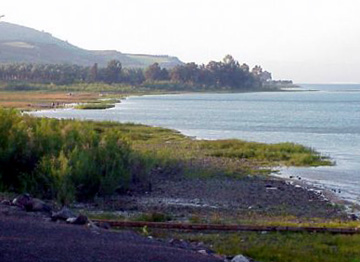In Monday’s post I summarized a “religious case for church-state separation” found in Jon Meacham’s recent Newsweek article. Meacham believes that Jesus originated the idea of church-state separation. In support of this claim, he refers to two passages in the New Testament Gospels, one in which Jesus refused to be crowned as king, and one in which Jesus said that his kingdom “is not of this world.”
Is Meacham correct in his answer to the WWJT question: What would Jesus think about the National Day of Prayer? Yesterday, I issued a warning about any time people claim Jesus for their side of an issue. The tendency to make Jesus say exactly what we want him to say runs rampant. So, now that you’ve been duly warned, I’ll do my best to evaluate Meacham’s claims on the basis of a careful, contextual reading of the relevant New Testament texts.
Jesus Refused to Be Crowned as King
In the Gospel of John of the New Testament we read the following:
When Jesus realized that they were about to come and take him by force to make him king, he withdrew again to the mountain by himself. (6:15)
 The context tells us something about the “they” who intended to crown Jesus. A large crowd of people had gathered around him near the Sea of Galilee because they were drawn to his miraculous healings (6:1-2). Jesus became concerned about the people because they lacked food (6:5). But all that was available was a boy’s sack lunch (five barley loaves and two fish; 6:8). So Jesus instructed the people to sit while he broke the loaves and fish and had them distributed to 5,000 people. After they finished eating, there was much to spare (6:13). The people were impressed, saying to each other, “This is indeed the prophet who is to come into the world.” But Jesus sensed that something else was afoot, that the people were going to try and make him their king. So “he withdrew again to the mountain by himself” (6:15). (Photo: The Sea of Galilee. “Image courtesy of www.HolyLandPhotos.org.” If you’re looking for excellent photos of biblical sites, check out this great website.)
The context tells us something about the “they” who intended to crown Jesus. A large crowd of people had gathered around him near the Sea of Galilee because they were drawn to his miraculous healings (6:1-2). Jesus became concerned about the people because they lacked food (6:5). But all that was available was a boy’s sack lunch (five barley loaves and two fish; 6:8). So Jesus instructed the people to sit while he broke the loaves and fish and had them distributed to 5,000 people. After they finished eating, there was much to spare (6:13). The people were impressed, saying to each other, “This is indeed the prophet who is to come into the world.” But Jesus sensed that something else was afoot, that the people were going to try and make him their king. So “he withdrew again to the mountain by himself” (6:15). (Photo: The Sea of Galilee. “Image courtesy of www.HolyLandPhotos.org.” If you’re looking for excellent photos of biblical sites, check out this great website.)
Why Did the People Want to Crown Jesus as King?
In the time of Jesus, it was not unusual for a charismatic figure to gather around himself a cadre of followers who acknowledged him as a leader, perhaps even as their ruler. These messianic figures would sometimes lead some minor revolt against Rome, only to be crushed under the thumb of Roman might. Galilee, the seedbed of Jesus’ ministry, seemed to be particularly fertile ground for this sort of behavior.
For example, according to the ancient Jewish historian Josephus, several years before Jesus emerged on the scene, a Galilean named Judas “got no small multitude together, and broke open the place where the royal armor was laid up, and armed those about him, and attacked those that were so earnest to gain the dominion” (War 2.4.1, see also 2.8.1 and Acts 5:36-37). In John 6, it seems that the people who had been fed miraculously by Jesus associated him with rebels such as Judas. But why would they connect a miracle of food-creation with rebellion against Rome? Why might they consider a supernaturally-endowed prophet to be a royal figure, one who could confront and even defeat the power of Rome?
Whereas we tend to see the miracle of the feeding of the 5,000 as a religious event or a demonstration of Jesus’ compassion, those who were fed sensed a politically pregnant moment. They seem to have identified Jesus with the long-awaited “prophet like Moses” promised in Deuteronomy (18:15-18; 34:10-12). Moses, of course, was not just a religious lawgiver, but also a deliverer who set Israel free from political bondage. One of the major signs of his divine authority was the provision of food (manna) in the wilderness.
Moreover, those who ate their fill of Jesus’ bread might have remembered prophecies in which God connected his future salvation with his provision of food for his flock. In Micah 5, for example, the ruler of Israel (who will be born in Bethlehem) “shall stand and feed his flock in the strength of the Lord” (5:2-5). Similarly, Ezekiel 34 promises that when “David” comes to shepherd God’s flock, “he shall feed them” (34:13-23). So when Jesus fed people by divine power, they quite naturally supposed that he might be Israel’s king, the anointed one, the Messiah.
This story in John 6 illustrates something we easily overlook: the inseparable connection in the minds of first-century Jews between religion and politics. When Jesus fed the multitudes, not only did they enjoy a free lunch as beneficiaries of God’s power, but also they assumed that this power should take political forms. Because Jesus worked wonders, he was not just the long-awaited prophet, but also the one through whom God’s actual kingdom would be reestablished in Israel. Given so many prophetic passages that spoke of God’s coming reign in plainly political terms, not to mention Jewish prayers that sought divine government in Jerusalem, Jews in the day of Jesus simply assumed that the kingdom of God would be a political one. It would involve kicking the Romans out of the land and reconstituting the government of Israel under the rule of God and, perhaps, his anointed king.
The powerful works of Jesus seemed to guarantee his success as a political ruler. Furthermore, these works illustrated and undergirded Jesus’ central message: “The time is fulfilled, and the kingdom of God has come near; repent, and believe in the good news” (Mark 1:15). If he proclaimed the coming of the kingdom of God, and if he did works of power that revealed him to be a “prophet like Moses” and a shepherd in the line of David, then surely Jesus was the king of the Jews who would set them free from the Romans and establish God’s kingdom in Israel. Right?
The Response of Jesus and Meacham’s “Case”
Not exactly, according to Jesus. At least not according to the account of John 6. Here we are told simply that Jesus “withdrew again to the mountain by himself” rather than allowing the people to force him to become their king. Meacham’s claim that Jesus “withdrew and hid” goes beyond the evidence of the text, but is well within the bounds of poetic license. For reasons not explained in John 6, Jesus did not claim political power when it was offered to him. Rather, he chose a different course.
This text alone provides flimsy evidence for Jesus as the originator of the separation between church and state. But it offers even less support for those who would use the power of the state to advance the agenda of the church. So, Meacham may be onto something. But if his “religious case” for the separation of church and state is to be at all persuasive, it will need more support from the other Gospel passage cited by Meacham, where Jesus explains that his kingdom is “not of this world.” I’ll examine that text tomorrow.

